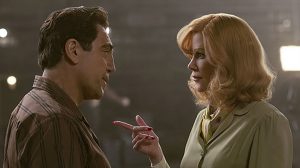
It’s always a challenge to cast a movie about famous people, and in television there have been few people as well-known as Lucille Ball. So, when writer/director Aaron Sorkin announced Nicole Kidman would play Lucy in “Being The Ricardos,” it raised a lot of eyebrows.
The good news is that Kidman does an excellent job. She has Lucy’s timing, attitude, and rasp — to the point where, in the sitcom scenes, she takes the tone up a notch to match the comedienne’s on-screen persona. As for Javier Bardem as Desi Arnaz, once you get past his accent being Spanish, not Cuban, he’s fine, and the two stars radiate the right kind of chemistry in their scenes together.
Sorkin has a penchant for combining multiple real-life occurrences into a shorter timeline, and he does it again in “Being The Ricardos,” squeezing three substantial incidents (which took place at different times) into a single week, and lets those events be the antagonists. Lucy’s accused of being a communist, a big deal during the Red Scare era. A tabloid newspaper reveals one of Desi’s extra-marital affairs. Lucy announces she’s pregnant and the couple wants to write it into the show, but the network and the sponsor vehemently object.
As if that’s not enough, there are subplots involving the “I Love Lucy” co-stars, Vivian Vance (Nina Arianda) and William Frawley (JK Simmons), flashbacks to the decision that changed Lucy’s career path from movies to television, and her insistence on having Desi as her co-star.
It’s a lot to juggle, yet Sorkin has always been a master at combining multiple plots (e.g. any episode of “The West Wing”), and he pulls it off again in “Being The Ricardos.” In addition to showcasing Lucy’s comedic talents, Sorkin’s script reveals how important Desi was to the success of “I Love Lucy” as a businessman and innovator. He was the one who created the three-camera sitcom stage setup still used today, allowing the show to be shot in front of a studio audience to get immediate feedback to the material and serve as a laugh track for viewers.
Oh, I could nitpick some small points. Like when a character refers to “taping” the TV show in an era when TV used film, not videotape. Or when head writer Jess Oppenheimer refers to himself as the “showrunner,” a term that’s only become in vogue in the last 25 years. Or when characters use more contemporary phrases like, “Can we have the room?” or “It’s six to five and pick’em whether we even have a show to do this week.” Those are script points that Sorkin has used in nearly every one of his projects — watch this montage of Sorkinisms for more examples.
The element of “Being The Ricardos” that doesn’t work is the framing device of having the three “I Love Lucy” writers — Oppenheimer, Madelyn Davis, and Bob Carroll, Jr. — speaking about the crises of that week as flashbacks, as if we needed emphasis on how difficult that period was for all concerned. There’s nothing wrong with the performances by John Rubenstein, Linda Lavin, and Ronny Cox or the actors who play their younger versions (Tony Hale, Alia Shawkat, and Jake Lacy), it’s just an unnecessary extra layer.
I was never an “I Love Lucy” fan. Although I’ve seen the highlight reels, and found individual scenes quite funny, the sitcom itself wouldn’t go on my list of the medium’s best. And her later efforts (“Here’s Lucy” and “The Lucy Show”) were pale imitations. Yet there’s no denying that Ball knew comedy, specifically of the physical variety, and Arnaz was a television trailblazer. “Being The Ricardos” emphasizes both of those points while also serving as pretty good entertainment on its own.
I give “Being The Ricardos” a 7.5 out of 10. Now streaming on Amazon Prime Video.
